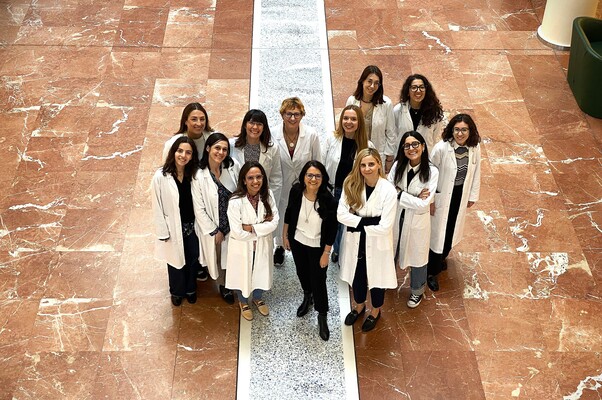News
Cadherin 17 is a new target for the efficient and safe treatment of colorectal cancer liver metastases using CAR-T cell therapy
Liver metastases are the first cause of death in patients with colorectal cancer, as they poorly respond to currently available therapies like chemotherapy and surgery.
CAR-T cell therapy could be an option to treat liver metastases, but this immunotherapeutic strategy, which holds promise against hematological malignancies, remains challenging for solid tumors. Among other reasons, this is primarily due to the lack of cancer-specific antigens as selective targets for CAR-T cell action.
In a study just published in Science Translational Medicine, researchers from the Innovative Immunotherapies Lab, led by Doctor Monica Casucci at IRCCS San Raffaele Hospital, have identified the adhesion molecule cadherin 17 (CDH17) as a novel, cancer-specific antigen to treat liver metastases in colorectal cancer using CAR-T cells.
The study
«In this study, we aimed at looking for a suitable target for the development of an effective as well as safe CAR-T therapy to treat liver metastases of colorectal cancer. Through the application of a rational workflow, we identified a protein highly expressed by cancer cells, but with limited presence in healthy tissues» states Dr Beatrice Greco, the first author of the study.
The authors found significant expressions of the CDH17 transcript and protein in cancer cells obtained from liver metastases derived from patients with colorectal cancer. Moreover, CDH17 was highly expressed all over the surface of cancer cells, which makes this target easily accessible to CAR-T cells. Among healthy tissues, the CDH17 transcript was found only in the intestine where, however, protein expression is restricted to lateral cell/cell junctions, which are inaccessible to CAR-T cells.


Team Dr. Monica Casucci
«Once the target was identified, we developed specific CAR-T cells and tested their safety and efficacy profile in multiple pre-clinical models,» adds Dr Rita El Khoury, co-first author of the study. The authors assessed the safety and efficacy of two different delivery routes of CDH17 CAR-T cells in preclinical models of colorectal-cancer derived liver metastases.
Systemic (i.e. intravenous) and intrahepatic administration of CDH17 CAR-T cells were equally effective in blocking tumor growth in mouse models of liver metastases.
However, systemic administration was safer and far less toxic than the intrahepatic one, since direct infusion of CDH17 CAR-T cells in the liver triggered a cytokine storm in the animal model. Importantly, the authors showed that CDH17 CAR-T products were also effective at killing patient-derived tumor organoids in vitro and in vivo when transplanted in animal models.
These findings identify CDH17 as a new, tumor-specific target for the action of CAR-T cell products. Accordingly, the high expression levels and surface distribution of CDH17 in cancer cells enable CDH17 CAR-T cells to specifically target the tumor while sparing healthy cells.
This was confirmed by co-culture of CDH17 CAR-T cell products with colonic slices derived from patients with colorectal cancer. These products effectively reacted against cancer lesions, while sparing healthy tissue slices derived from the same patients.
Future perspectives
This work is an important step towards the starting of clinical studies for treating liver metastases in colorectal cancer.
The San Raffaele Biological Resources Center was crucial to achieve this ambitious objective. This Center is a biobank of excellence that collects, stores and distributes human biological samples and associated data to support translational clinical research. It guarantees high quality standards, safety and ethics, participating also in international networks, such as BBMRI-ERIC. This activity favors innovative studies and shared access to fundamental resources for the scientific community.
«Our work provides a new therapeutical framework for the treatment of colorectal cancer-derived liver metastases», says Doctor Casucci. «The next step will be the start of a phase 1/2 clinical trial to test the safety and efficacy of the CDH17 CAR-T cell therapy in patients with metastatic colorectal cancer. These results could open new therapeutic perspectives also for other tumors that express Cadherin-17, such as gastric cancer and neuroendocrine tumors».
The study is part of an ambitious research program, started six years ago, which benefits from the contribution of the Italian Association for Cancer Research (AIRC) and involves 17 research and clinical groups from San Raffaele Hospital and Vita-Salute San Raffaele University, with the aim of developing advanced therapies against liver metastases from colorectal and pancreatic cancer. «We are proud of our achievements, which show researchers’ and pysicians’ efforts in transforming lab results into concrete therapeutic possibilities for all patients», says Professor Chiara Bonini, project coordinator, head of the Experimental Hematology Unit and Full Professor in Hematology at Vita-Salute San Raffaele University.
«The translational mission is the distinctive characteristic of San Raffaele: offering the best clinical and research expertise to patients and contributing to the progress of scientific knowledge, as well as its application in the daily practice», concludes Professor Fabio Ciceri, Director of the Comprehensive Cancer Center, head physician of Hematology and Bone Marrow Transplantation at San Raffaele Hospital and Full Professor in Hematology at Vita-Salute San Raffaele University.
The study is the result of the collaboration between several internal Units of San Raffaele Hospital as well as international partners, such as the Cochin Institute at the Paris-Cité University, with the funding support of Fondazione AIRC per la ricerca sul Cancro, the Italian Health Ministry and Education, Universities and Research Ministry, and the European Union (European Research Council and Innovative Medicines Initiative).
Written by: Laura Celotto
Published on: 29 May 2025
